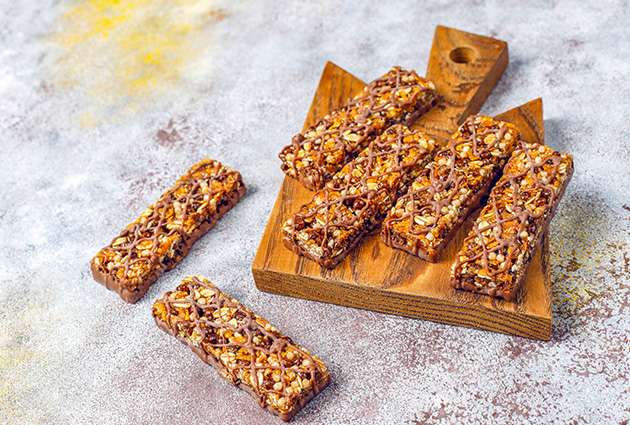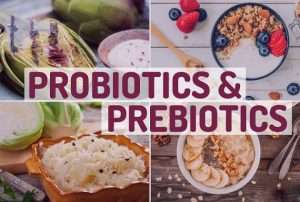Pre and Probiotics – The Secret to a Happy and Healthy Gut

How Do Prebiotics Work and What Are They?
Actual microorganisms or gut bacteria are not present in prebiotics. They serve as fuel for bacterial growth. Prebiotics all fall within the dietary fibre category. Chicory root, bananas, and asparagus all contain the prebiotic fibre inulin, which may be utilized as nutrition for gut health. Legumes, artichokes, and onions are great alternatives to prebiotics. The term “synbiotic” refers to a dietary supply that contains both pre and probiotic meaning. Cheese and some varieties of yoghurt are examples of synbiotic gut health foods. Prebiotics are also available as dietary supplements in the form of pills or as meal additives. Various liquid and powdery versions are available. Plix’s Good Gut is a plant-based product with natural ingredients like chicory root, green apple, 20Bn CFUs and 6 strains of probiotics that promote the production of friendly gut bacteria, lessen digestive discomforts like gas, diarrhoea and stomachache and produce healthy gut bacteria for a good and healthy gut.
Prebiotics are organically occurring, indigestible dietary substances that have been shown to encourage the development of beneficial gut bacteria within your tummy, enhancing gut health. To put it plainly, they promote beneficial microbes. Prebiotics might promote the absorption of calcium while also improving digestive health.
Galactooligosaccharides and fructooligosaccharides, including inulin, are examples of prebiotics. Instead of concentrating on these complex sentences, increase your intake of prebiotics by consuming extra fruits, vegetables, as well as whole grains throughout the day. Some examples are bananas, onions, asparagus, artichokes, and whole-grain foods.
How Do Probiotics Work and What Are They?
Two networks of gut bacteria are typically mentioned when someone mentions probiotic microorganisms. Both the Lactobacillus and Bifidobacterium species are connected to probiotic formulations. Numerous food items with a mild fermentation process have natural probiotics. Yoghurt, kimchi, and sauerkraut are a few choices. Additionally, pickles naturally contain probiotics. It is possible to buy probiotics as a nutritional supplement. They are available as fluids or powders. Probiotics typically need to be kept in the fridge to preserve the viability and potential for the reproduction of the gut bacteria they comprise.
The “friendly” bacteria, also known as living cultures, that are organically available in your stomach are known as probiotics. To balance gut health, such active cultures alter or replenish intestinal microbes. This functional element might improve intestinal health, general health, and resilience. Live cultures like bifidobacteria and lactobacilli are frequently found in dairy products that have undergone fermentation, such as yoghurt and some cheeses. They could function as probiotics. Certain other fermented gut health foods, such as kimchi, sauerkraut, and cultured non-dairy yoghurts, may include live cultures, but it’s possible that these varieties haven’t been well investigated yet to determine if they offer further health advantages.
Pre And Probiotic Meaning
Untold numbers of microbes cover each multicellular organism, encompassing both animals and plants. Microorganisms also referred to as microbes, including bacteria, viruses, yeast, parasites, and other tiny (microscopic) life forms. They are numerous and diverse organisms that reside on your skin, in your bodily fluids, and all along your digestive tract. We come into contact with innumerable microbes the minute we are born. There are more single-celled creatures on and inside of you than there are cells that comprise your own body. Their microbiota is a group of microbes that is particular to each person. The microbiome is a term used to describe the genetic data gathered from all of these bacteria in a specific habitat. The epidermis and the gastrointestinal system are two examples of bodily sections with unique microbiomes and gut bacteria.
Some place the number of gut bacteria in the stomach at 100 trillion, representing about 500–1,000 distinct species. There is a delicate equilibrium despite such great numbers and diverse species. These gut bacteria and we, ourselves, have co-evolved; we provide them with a home and nourishment, and they promote our general health. They alter the immune function, create specific vitamins, nutrients, and essential fats, inhibit the growth of dangerous germs, and enhance human well-being in ways that experts are currently trying to fully understand.
Benefits Of Prebiotics and Probiotics
Enhancing gut health: Probiotics are understood to benefit digestion, regularity, and the prevention of diarrhoea. Nausea, gas, and bloating can be reduced with a healthily functioning digestive tract. Inflammatory bowel disease, irritable bowel syndrome, urinary tract infections, as well as other medical problems may all benefit from the use of probiotics.
Treatment And Prevention Of Diarrhea: Probiotics might decrease the intensity and length of diarrheal disease, according to a study. Probiotics can decrease the likelihood of diarrhoea brought on by antibiotics usage, according to other research. The far more efficient treatments for the runs were discovered to be L. rhamnosus, L. casei, as well as the yeast S. boulardii.
Boosting Your Immunity: Your immune response is strengthened by probiotics towards a variety of pathogens. You are guarded against harmful bacteria, such as yeast, fungus, and virus overgrowths, by maintaining a balanced number of gut bacteria in your system for improved gut health. A study on gut health demonstrated that the strains of Lactobacillus and Streptococcus shielded cells from E. coli infections. According to a different study, consuming Lactobacillus crispatus by females cut the incidence of UTIs by about 50%.
Lowering Blood Pressure: Probiotics may aid in lowering blood pressure, according to a research study. When taken every day for about seven-eight weeks or longer, probiotics containing many strains (those that contained more than 10 million) have been the most helpful.
Losing Weight: Research suggests that women on a diet plan who consumed L. rhamnosus for 3-4 months lost 50% more weight. According to a different study, L. paracasei can truly prevent the accumulation of fat.
The “Dynamic Duo” of Prebiotics and Probiotics?
Probiotics and prebiotics ultimately complement one another. For living probiotics, that can enhance gut health, the prebiotics serves as their breakfast, lunch, and supper. Consuming food supplements that are good for your health, such as those that include prebiotics and probiotics combined, helping you become healthy. That may include serving yoghurt with bananas as a topping or just stir-frying some asparagus with tempeh. Contact a licensed nutritionist for detailed guidance on where to find pre and probiotic meaning according to your unique healthcare needs, particularly if you have digestive problems or a fragile immune system.
How Do You Start With Probiotics
Buying can be perplexing due to the general market oversaturation with numerous probiotic pills and food items. Customers need to understand that not every one of these foodstuffs carries live probiotic microorganisms. When buying fermented gut health foods like sauerkraut and pickles, go for the frozen types because the shelf-stable kinds have indeed been pasteurized, which eliminates germs. Additionally, consumers might look for phrases like “living and active cultures” on labelling requirements. Having probiotic gut health foods frequently appears to be the best efficient way to maintain the advantages because consuming probiotic gut health foods seldom may only give beneficial microorganisms for a brief amount of time upon ingesting them.
Prebiotics are present in plant-based foodstuffs with lots of fibre and they must be consumed often as they nourish probiotic microorganisms. There are a variety of gut health foods that include prebiotics, a few of which are mentioned below:
- Vegetables such as chard, collard greens, spinach, artichokes, asparagus, broccoli, cabbage, mushroom, onion, and sweet potato.
- Apples, bananas, berries, kiwis, guavas, pomegranates, and blueberries are some examples of fruits.
- Legumes include lentils, soybeans, peas, and chickpeas.
- Grains: whole wheat, barley, corn, oats, rice
- Almonds, flaxseed, peanuts, and walnuts are some seeds and nuts.
It’s preferable to consume a range of meals out of this collection since various probiotic organisms appreciate various prebiotic gut health foods. The additional major advantage of consuming a wide array of all these meals is that doing so will enrich the diet with lots of essential vitamins and minerals.
It is indeed advisable to start gradually by introducing modest quantities of brand-new foods if you don’t currently include pre and probiotic-meaning items in your regimen. The microbiota needs little time to adapt to adjustments, and introducing too many at once could irritate your tummy. If you think it will be too difficult for you to eat enough of these nutritious gut health foods, go to your doctor to see if supplementation may well be necessary. It is important to consult with your doctor or registered dietician before trying a fresh new supplement because they can vary greatly but every individual has a different composition of gut health and gut bacteria.
Frequently Asked Questions
1. What are beneficial bacteria and what are their advantages?
Probiotics commonly referred to as good gut bacteria, aid in the digestion of food, nutrient absorption, and vitamin production in the digestive system for healthy gut health.
2. What Distinguishes Prebiotics From Probiotics? Prebiotics vs. Probiotics: Which Is Better?
Take Plix Good Gut to benefit from pre- and probiotics’ combined health advantages. Through the production of beneficial microorganisms, probiotics promote intestinal health. Prebiotics, however, support healthy microorganisms. The advantages of probiotics and prebiotics go beyond their separate applications.
3. Why is prebiotics good for gut health?
Prebiotics help probiotics develop while also enhancing digestion, metabolism, and mineral absorption. Assume them as nourishment for the healthy gut bacteria.
4. What Are the Side Effects of Good Gut and Who Can Consume It?
For people who desire improved gut health and are suffering from digestive problems, Good Gut is advised. It is best to speak with your doctor before ingesting the product if you are lactating, expectant, diabetic, or on any drugs. We do not advise that anyone under the age of 18 take this product. There are no negative side effects from using our vegan and all-natural products.
5. What function do probiotics serve?
Probiotics maintain a healthy mix of good gut bacteria in the gastrointestinal tract, stop diarrhoea and constipation, lift your spirits, and reduce gas and bloating.














